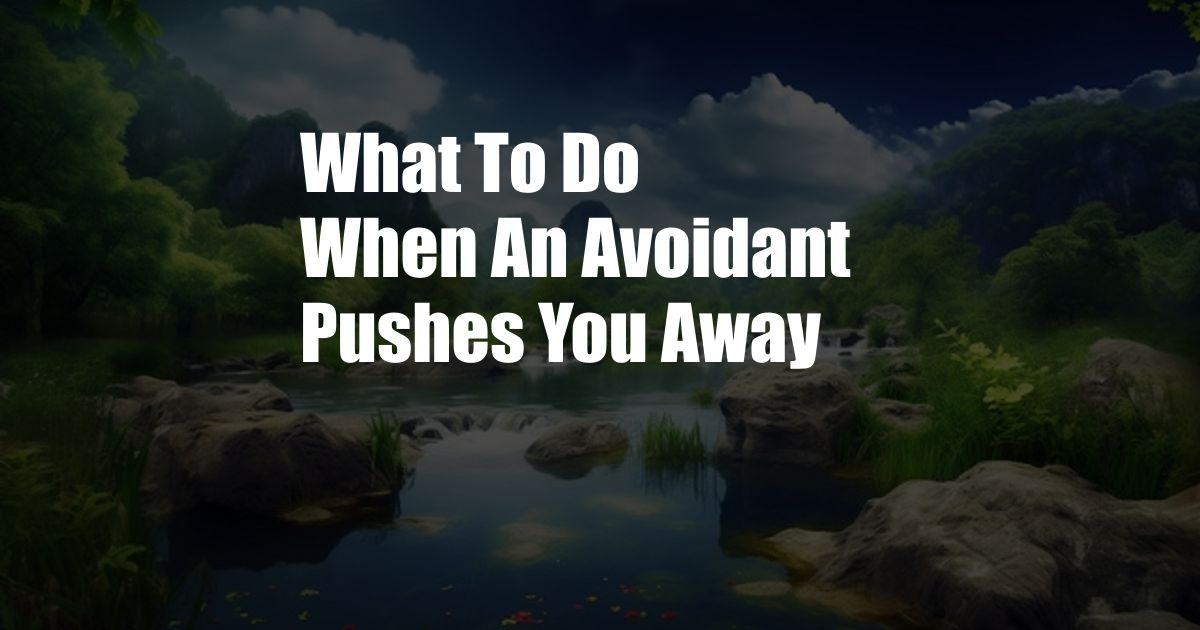
What to Do When an Avoidant Pushes You Away
Engaging in a romantic relationship with an avoidant can be a complex and challenging experience. It can leave you feeling confused, hurt, and unsure of what to do next. Avoidants often struggle with intimacy and closeness, leading them to push away their partners when they feel overwhelmed or threatened. If you’re struggling with such a situation, understanding the root causes of this behavior and developing coping mechanisms is crucial. This article aims to provide insights and practical advice on navigating this dynamic and finding a path forward.
Understanding Avoidant Attachment
Avoidant attachment stems from early childhood experiences, typically characterized by inconsistent or neglectful parenting. As a result, avoidants develop a deep-seated fear of abandonment and rejection. They subconsciously believe that getting too close to others will lead to pain and disappointment. This fear manifests in their romantic relationships, leading them to withdraw and push their partners away when they perceive any sign of threat to their independence.
Signs of an Avoidant Partner
Understanding the warning signs of an avoidant partner is essential. They may exhibit the following behaviors:
- Emotional Distance: They may struggle to express emotions openly and may appear aloof or unresponsive.
- Withdrawal: When feeling overwhelmed or threatened, they tend to withdraw from the relationship, both physically and emotionally.
- Communication Issues: Avoidants often have difficulty communicating their needs and feelings, leading to misunderstandings and resentment.
- Fear of Commitment: They may be hesitant to make long-term commitments or discuss the future, as it triggers their fears of losing their autonomy.
How to Navigate the Dynamic
Navigating a relationship with an avoidant partner requires patience, understanding, and a willingness to adapt. Here are some tips and expert advice:
- Communicate Openly: While avoidants may struggle to express themselves, it’s essential to communicate openly with them. Choose a calm and non-confrontational setting to share your feelings and concerns.
- Respect Their Boundaries: Understand that avoidants need space and time to process their emotions. Allow them to have this time without pressuring them or taking it personally.
- Set Realistic Expectations: Be mindful of the limitations of the relationship and avoid expecting an overly close or intimate bond. Focus on building a strong friendship and support system instead.
- Focus on Self-Care: It’s crucial to prioritize self-care when dealing with an avoidant partner. Engage in activities that bring you joy and fulfillment, and seek support from friends, family, or a therapist.
Expert Insight
“Avoidant partners often struggle with the concept of self-worth,” says Dr. Emily Carter, a licensed psychologist. “It’s important to help them build a positive self-image by providing positive reinforcement and highlighting their strengths.”
“When an avoidant partner withdraws, it’s crucial to give them space while also communicating that you’re there for them when they’re ready to talk,” adds Dr. Peter Johnson, a renowned relationship counselor.
FAQs
Q: Can an avoidant partner ever change?
A: While it’s challenging, it’s possible for avoidants to change with therapy, self-awareness, and a willingness to work on their attachment style.
Q: What should I do if my avoidant partner breaks up with me?
A: Respect their decision and give them space. Focus on taking care of yourself and understanding that it’s not necessarily a reflection of your worth.
Q: Is it worth staying in a relationship with an avoidant partner?
A: The decision is deeply personal and depends on factors such as the severity of the avoidance, your own needs, and the level of support you have.
Conclusion
Dealing with an avoidant partner requires empathy, understanding, and perseverance. While it can be a challenging journey, it’s essential to prioritize your own well-being and establish healthy boundaries. Remember that you are not alone and support is available. If you’re struggling with this dynamic, don’t hesitate to reach out for professional help.
Are you interested in learning more about relationships with avoidant partners?